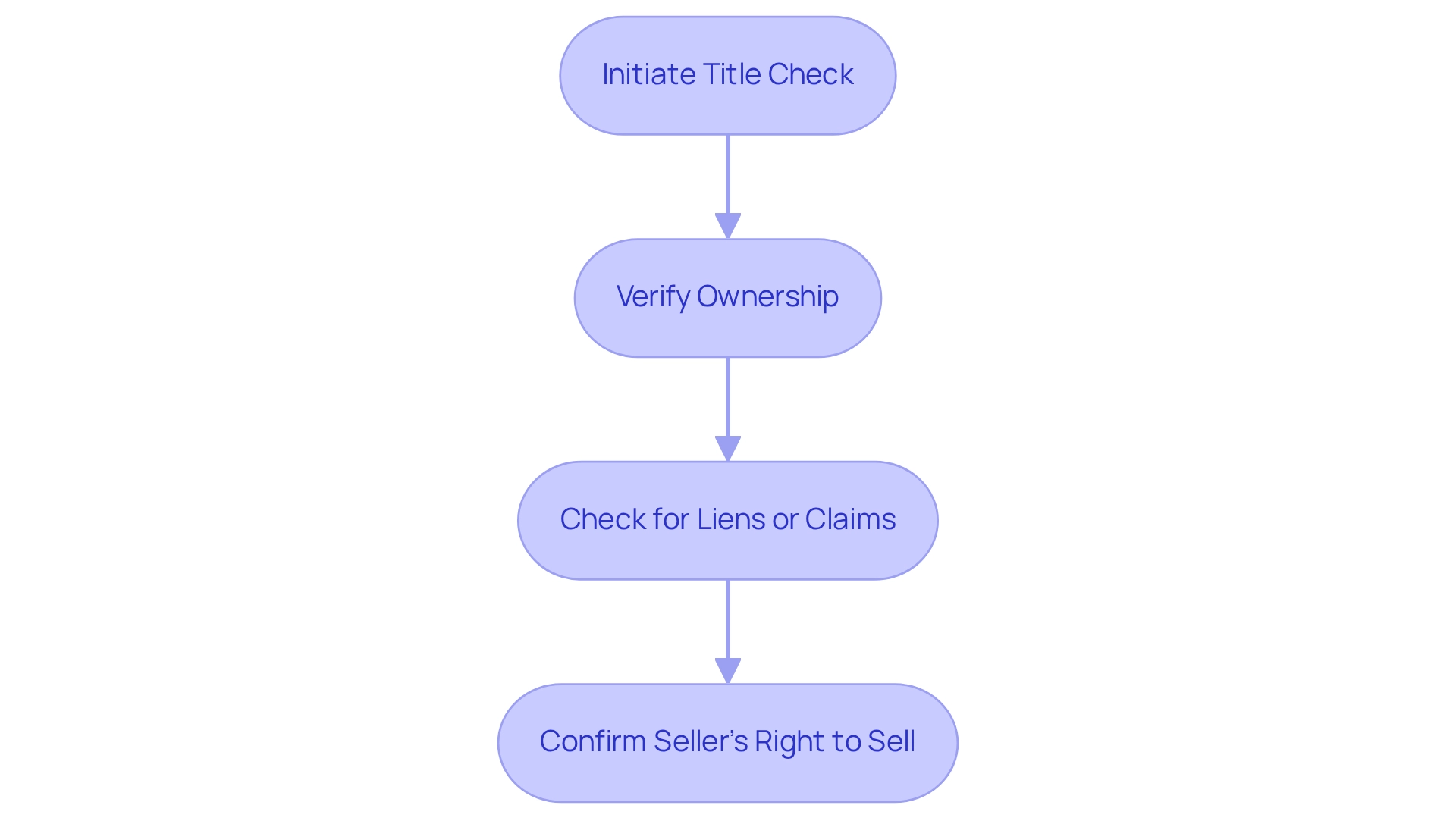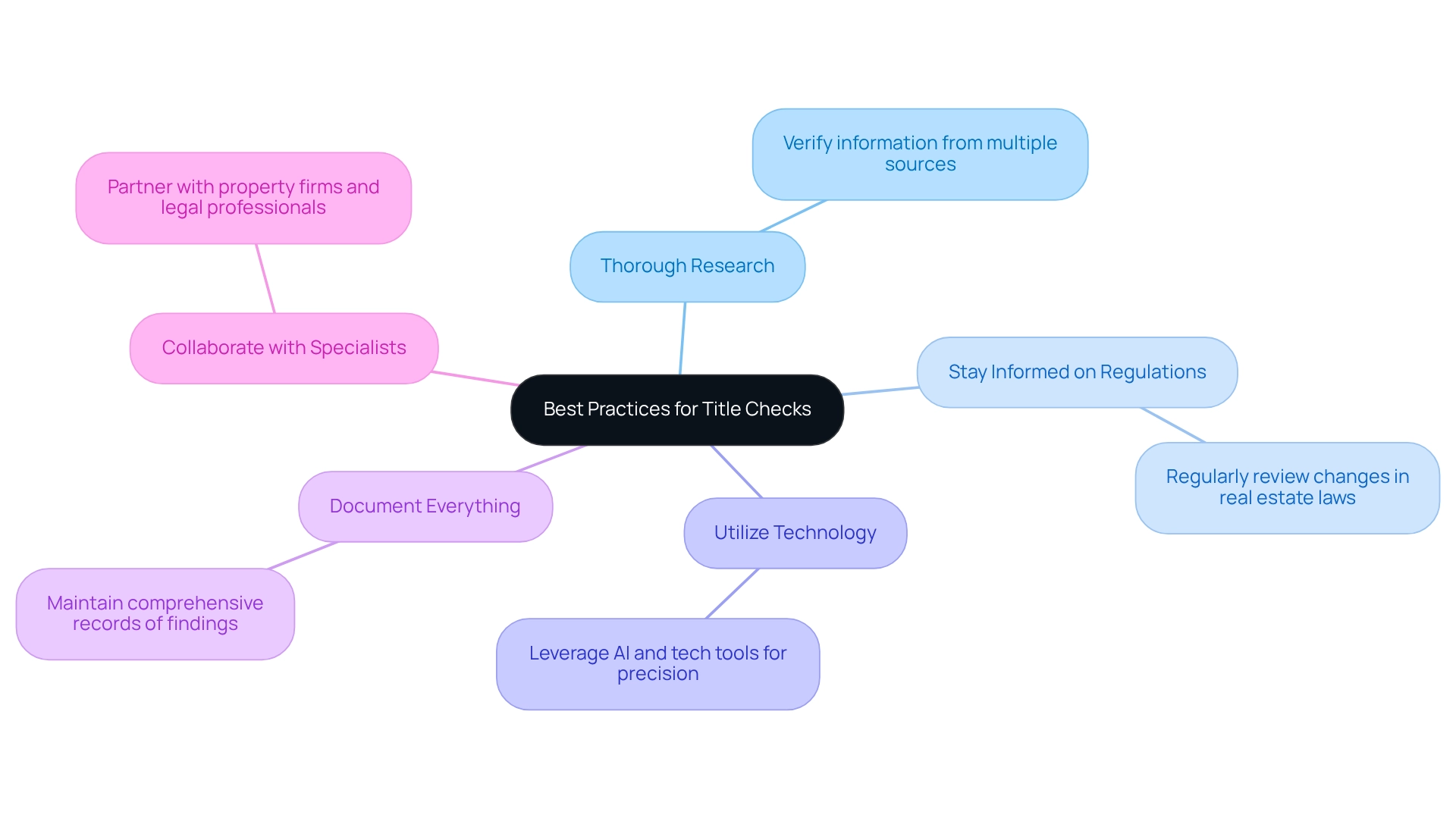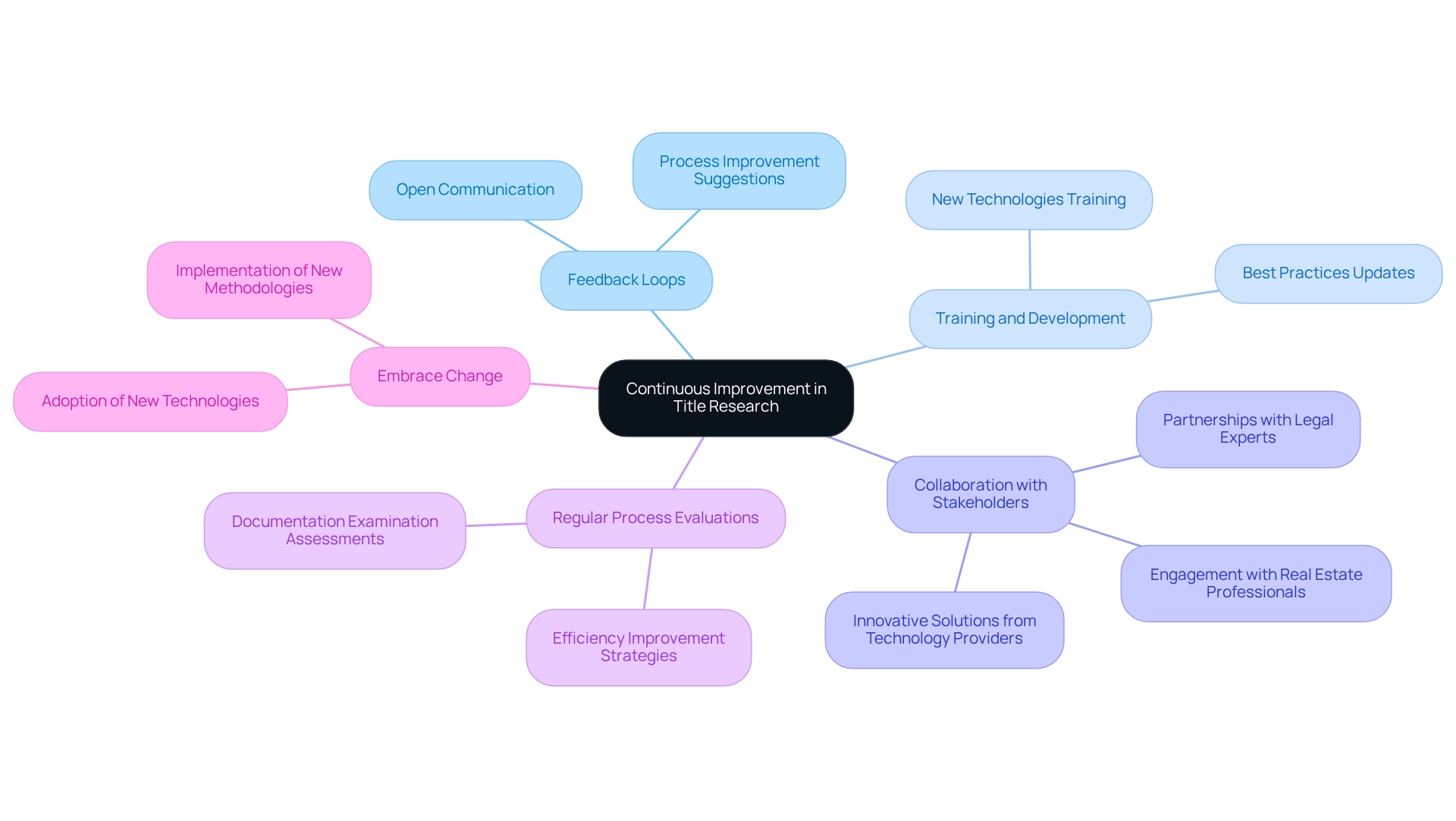Overview
The article presents a comprehensive step-by-step guide for conducting a title check in New York, highlighting the critical importance of verifying property ownership and identifying any claims or liens associated with the asset. It outlines a meticulous process that encompasses:
- Gathering asset information
- Reviewing public records
- Consulting with legal experts
Consequently, this approach empowers real estate professionals to navigate potential challenges effectively while adhering to legal regulations.
Introduction
In the intricate world of real estate, ensuring a clear and marketable title is paramount to a successful transaction. Title checks serve as a critical safeguard, verifying legal ownership and uncovering any claims or liens that could jeopardize a buyer's investment. Furthermore, with the complexities of New York's legal framework governing property transactions, understanding the nuances of title checks becomes essential for real estate professionals. This article delves into the importance of title checks, the legal requirements in New York, and the step-by-step process for conducting them effectively. Additionally, it highlights common challenges faced during title research and how innovative technologies, such as artificial intelligence, can streamline these processes for greater accuracy and efficiency.
Understanding Title Checks: What They Are and Why They Matter
An ownership verification is a crucial procedure that confirms the legal possession of an asset and reveals any claims or liens associated with it. This process is particularly vital in , as a title check in New York ensures that the seller has the right to sell the property and that there are no outstanding issues that could affect the buyer's ownership. By conducting a title check in New York, parties can avoid legal conflicts and monetary setbacks, ensuring that the ownership is unencumbered and sellable.
For real estate experts, understanding property inspections is the initial action in protecting their transactions and guaranteeing adherence to legal obligations.

Legal Framework for Title Checks in New York: Key Regulations and Requirements
In New York, the title check ny process is governed by various laws and regulations that ensure the integrity of property transactions. Essential regulations encompass the New York Real Property Law, which outlines the requirements for conducting ownership searches, including the necessity of performing a title check ny and acquiring ownership insurance. Furthermore, real estate professionals must remain cognizant of local ordinances and any specific requirements established by county clerks.
Compliance with these regulations is paramount to avoid legal complications and ensure that all transactions are valid and enforceable. To enhance the effectiveness and precision of property analysis, experts can leverage advanced machine learning tools and automated document processing solutions, such as those provided by Parse AI. Parse AI's example manager empowers users to swiftly annotate documents, while its robust automation extracts crucial information, thereby accelerating the information-gathering process.
This capability is essential for thorough and precise research on ownership, which is vital for . The founders of Parse AI bring over 50 years of industry experience, adeptly addressing the challenges associated with confirming real property ownership. It is advisable for professionals to consult with legal specialists or property firms to stay informed about any changes in the law, ensuring that their practices comply with .
Step-by-Step Process for Conducting a Title Check in New York
To conduct in New York, follow these steps:
- Gather Asset Information: Collect essential details about the asset, including the address, parcel number, and the names of current and previous owners.
- Visit the County Clerk's Office: Go to the county clerk's office where the land is situated, as this is where public records are maintained.
- Request Document Records: Inquire about the document records associated with the real estate. You may need to fill out a request form and pay a small fee.
- Review Public Records: Examine the documents for any liens, mortgages, or claims against the asset. Look for any discrepancies in ownership.
- Obtain an Abstract of Ownership: If necessary, request an abstract of ownership, which summarizes the history of the property’s possession and any legal issues.
- To ensure accuracy, a title check in New York is necessary. Consult with a title provider for a thorough review; consider hiring a title provider to conduct a more detailed search and offer title coverage.
- Document Findings: Maintain thorough records of your discoveries and any measures implemented to address problems noted during the assessment.
Common Challenges in Title Checks and How to Overcome Them
Carrying out a title check in New York can be fraught with obstacles that require careful navigation. Understanding the significance of is crucial for real estate professionals, as it lays the foundation for successful transactions. Here are some of the most common issues faced, along with effective strategies to address them:
- Incomplete Records: Public records may occasionally be absent or not fully detailed, obstructing the ownership research process. To mitigate this issue, it is advisable to consult multiple sources, including online databases, local archives, and even neighboring jurisdictions. This thorough approach can assist in addressing deficiencies and guarantee a more precise verification.
- Discrepancies in Ownership: Conflicting information regarding asset ownership presents a frequent challenge. To resolve discrepancies, it is crucial to verify details against multiple documents, such as previous deeds, tax records, and court filings. In cases of significant conflict, consulting with legal experts can provide clarity and ensure compliance with state regulations. Statistics indicate that a substantial percentage of ownership checks, such as title checks in New York, encounter discrepancies, underscoring the importance of thorough research and verification.
- Liens and Encumbrances: Unpaid taxes or existing liens can complicate real estate transactions. Conducting thorough searches early in the process is essential to identify these issues. Utilizing advanced technology, such as Parse AI, can expedite the identification of liens and encumbrances, allowing for timely resolution before closing. Parse AI's innovative platform tackles the challenges of verifying real estate ownership by employing machine learning and optical character recognition to swiftly extract crucial information from ownership documents, offering substantial cost reductions and enhanced precision for real estate professionals.
- Complex Legal Language: The legal terminology found in property documents can often be challenging to interpret. Hiring a property attorney or a qualified firm can assist in clarifying perplexing terms and ensuring that all parties comprehend their rights and responsibilities under the law. As Sandy Gadow, author of 'The Complete Guide to Your Real Estate Closing,' states, "An insurance policy will be your best protection against those and many other ownership issues that may become known after you finalize your transaction."
- Time Constraints: Title checks can be time-consuming, particularly when dealing with extensive records. Leveraging technology, such as machine learning and optical character recognition, can significantly streamline the process. For example, Parse AI's innovative platform enables researchers to extract essential information from document records quickly, enhancing efficiency and precision in completing abstracts and reports.
Furthermore, wire fraud is recognized as one of the largest dangers in the real estate sector, emphasizing the necessity for vigilance and protective measures. By employing these strategies, real estate experts can manage the intricacies of property checks more efficiently, ensuring smoother transactions and enhanced client satisfaction. The ALTA Foundation's dedication to tackling challenges in the sector is clear, having exceeded $1.2 million in donations with the most recent grant awards, further reinforcing the necessity for strong solutions in property investigation.
Leveraging Technology: How AI Can Streamline Your Title Research Process
Incorporating AI into the title research process can significantly enhance efficiency in several key ways:
- Automated Document Analysis: AI tools excel at rapidly analyzing extensive collections of document titles. By extracting relevant information and identifying potential issues, these systems streamline the research process, allowing researchers to focus on more complex tasks.
- Error Reduction: The automation of repetitive tasks through AI minimizes the risk of human error. This results in more precise property checks, which is essential in upholding the integrity of property transactions.
- Faster Turnaround Times: AI significantly decreases the time needed to finish property searches. With the ability to process information quickly, real estate professionals can close deals more efficiently, enhancing overall productivity in the industry. Current statistics indicate that the use of AI in research has increased efficiency by up to 30%, underscoring its transformative impact.
- Data Integration: AI systems can effortlessly combine information from diverse sources, providing a complete overview of ownership and any related claims. This holistic method ensures that researchers have access to all relevant information, facilitating informed decision-making.
- Continuous Learning: One of the most compelling advantages of AI is its capacity for continuous improvement. These technologies learn from past searches, refining their algorithms to enhance future performance and accuracy. This adaptability is essential in a dynamic real estate market, where regulations and property details can frequently change. As mentioned by one commenter, "to look the judge in the eye, speak comfortably and be heard, hold up visual aids that could be seen by the judge, and perform without an architectural stigma," highlights the significance of clear communication and visual support in the process of inquiry.
The incorporation of AI in property analysis not only simplifies processes but also enables to react more efficiently to the changing needs of the industry. Furthermore, the Department's plans to revisit regulations regarding equipment and furniture highlight the need for compliance, which AI can help mitigate by ensuring adherence to existing model codes. As AI technology keeps progressing, its role in improving document analysis efficiency will only increase, making it an essential tool for experts in the industry.
Best Practices for Ensuring Accurate and Comprehensive Title Checks
To ensure accurate and comprehensive title checks, it is essential to adopt the following best practices:
- Conduct Thorough Research: Always verify information from multiple sources to guarantee accuracy.
- Stay Informed on Regulations: Regularly conduct title checks and review changes in real estate laws and regulations to maintain compliance.
- Utilize Technology: Leverage AI and other technological tools to streamline the investigation process and enhance precision.
- Document Everything: Maintain comprehensive records of all findings and communications related to the verification process.
- Collaborate with Specialists: Partner with property firms and legal professionals to address complex matters and ensure thoroughness in your inquiry.

The Importance of Continuous Improvement in Title Research: Collaborating for Success
Ongoing enhancement in title check NY is essential for adapting to evolving regulations and market circumstances. This necessity underscores the significance of accurate title research and the challenges that arise in the process. Below are key aspects to consider:
- Feedback Loops: Establish mechanisms for team members to provide feedback on processes and outcomes. This fosters a culture of open communication that is vital for continuous improvement.
- Training and Development: Invest in ongoing training for position researchers to keep them updated on best practices and new technologies, ensuring they remain at the forefront of the industry.
- Collaboration with Stakeholders: Engage with real estate professionals, legal experts, and technology providers to identify challenges and develop innovative solutions that enhance the title research process.
- Regular Process Evaluations: Periodically assess and improve documentation examination processes to enhance efficiency and precision, which is crucial for maintaining accuracy in title checks.
- Embrace Change: Be open to adopting new technologies and methodologies that can significantly improve the title research process, ensuring it remains effective and relevant.
By focusing on these aspects, organizations can not only navigate the complexities of title checks but also position themselves as leaders in the industry.

Conclusion
A clear and marketable title is fundamental to successful real estate transactions, particularly in New York's complex legal landscape. Conducting title checks is essential not only for confirming legal ownership but also for identifying potential claims or liens that could jeopardize a buyer's investment. By following a systematic approach—gathering property information, reviewing public records, and consulting with experts—real estate professionals can navigate the intricacies of title research effectively.
Understanding the legal framework governing title checks in New York is equally crucial. Compliance with the New York Real Property Law and local ordinances ensures that all transactions are valid and enforceable. Furthermore, integrating innovative technologies, such as artificial intelligence, can enhance the title research process by automating document analysis, reducing errors, and improving turnaround times. By leveraging these advancements, real estate professionals can position themselves for success in an ever-evolving industry.
In conclusion, the importance of thorough title checks cannot be overstated. By adopting best practices, staying informed on regulatory changes, and embracing technological solutions, professionals can mitigate risks and facilitate smoother transactions. Continuous improvement in title research processes, through collaboration and training, will ultimately lead to greater accuracy and efficiency in the industry. As the landscape of real estate continues to evolve, prioritizing effective title checks will remain a critical component of ensuring secure and successful property transactions.
Frequently Asked Questions
What is ownership verification and why is it important?
Ownership verification is a procedure that confirms the legal possession of an asset and reveals any claims or liens associated with it. It is particularly vital in real estate transactions to ensure that the seller has the right to sell the property and that there are no outstanding issues that could affect the buyer's ownership.
How does a title check in New York benefit real estate transactions?
A title check in New York helps avoid legal conflicts and monetary setbacks by ensuring that the ownership is unencumbered and sellable, confirming that the seller has the legal right to sell the property.
What laws govern the title check process in New York?
The title check process in New York is governed by various laws and regulations, including the New York Real Property Law, which outlines the requirements for conducting ownership searches and acquiring ownership insurance.
What role do local ordinances play in the title check process?
Local ordinances and specific requirements established by county clerks must be considered by real estate professionals to ensure compliance and avoid legal complications in property transactions.
How can real estate experts enhance their property analysis?
Real estate experts can enhance their property analysis by leveraging advanced machine learning tools and automated document processing solutions, such as those provided by Parse AI, which help in annotating documents and extracting crucial information.
What is the significance of consulting legal specialists or property firms?
Consulting with legal specialists or property firms is advisable for professionals to stay informed about any changes in the law, ensuring compliance with the latest regulatory requirements and protecting their transactions.




